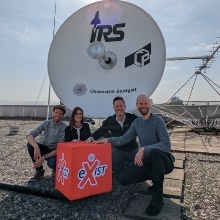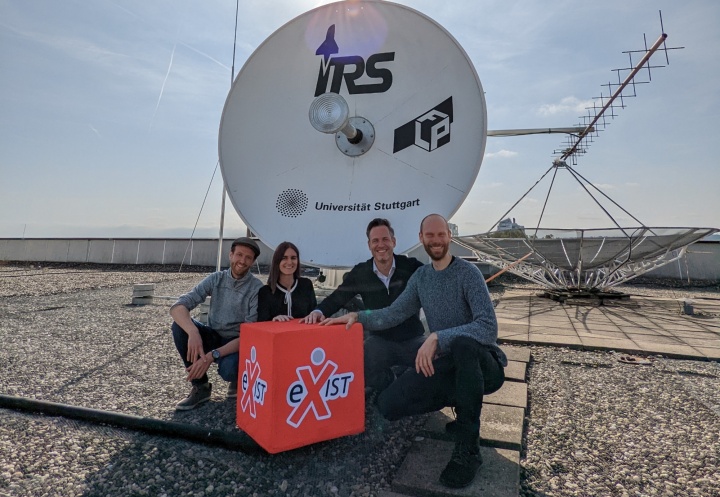Space travel is in a continual state of change. Development cycles for satellites have shortened considerably. As a result, the requirements for their operating systems have also changed. The University of Stuttgart start-up sat:io has developed a concept for the new demands on satellite software. The team provides holistic and scalable solutions that enable multi-mission satellite operations.
The starting costs for space travel have decreased considerably in recent years. Some satellites are only the size of shoe boxes – or even smaller. Their sensor technology is getting less expensive, smaller, and better. Artificial intelligence makes it possible to effectively process and evaluate the large volumes of data. All of this is helping to make conditions for space travel more favorable overall. This is why increasingly more startups and small and medium-sized companies are seizing the opportunity and establishing themselves in the space market – the “New Space” movement.
In the past, only a few institutional space projects were well funded. They were able to afford to develop their own – largely new – software for each new satellite mission. Today, developing an operating system for satellites is a major challenge, especially for start-ups backed by venture capital. These start-ups must quickly achieve their demanding business goals and acquire the expertise necessary to do so. “We can think of it as having to develop a new Windows operating system for every new laptop,” explains Florian Schilli, a team member at sat:io. Satellite operators would need a scalable system that they could use over again for new satellite missions with little integration effort. sat:io has recognized this change in the market and developed the corresponding solutions.
“We want to offer satellite operators a holistic solution so that they can reduce their integration effort. Instead of a large expensive overall system, our suite offers individual tools that can be used in or across project phases as needed.” The team offers their products as a pay-as-you-go model. This means that satellite operators pay only for the tools they need. These tools are immediately available to the operators and are already integrated into the overall system.
You can think of it as the Office package for Windows. “We have individual tools like Word, Outlook, and Excel. Their interfaces are perfectly matched and interact reliably with each other,” says Schilli. The aim is to support customers as far as possible along their entire value chain and to create added value.
One challenge that sat:io aims to solve is the automated resolution of conflicts within mission planning. During satellite operation, resources such as electrical power are consumed. Other resources are in use for a specific time window and thus not available elsewhere. For example, Earth observation sensor technology can perform only one observation at a time. The system considers resource availability within mission planning and automatically resolves conflicts. The basis for this is a resource management system that is part of a patent application jointly filed by sat:io and the University of Stuttgart.
Sat:io receives EXIST Transfer of Research funding
sat:io is a start-up of the Institute of Space Systems (IRS) at the University of Stuttgart. The founding members Susann Pätschke, Sebastian Wenzel, and Kai Leidig are alumni of the university. Seven people are working to make the team’s idea a reality. In September 2022, they received EXIST Transfer of Research funding from the Federal Ministry for Economic Affairs and Climate Action for their research. This funding supports outstanding research-based start-up projects that entail elaborate and high-risk development work. At the end of November 2022, the Berlin-based market research institute Capitol Momentum named sat:io the start-up with the most innovative business idea in the “New Space” industry in Germany.
The team receives expert support from the IRS, in particular from its mentor Professor, Sabine Klinkner. In parallel to the joint project EIVE, sat:io is developing the operating system for the 6U CubeSat together with university colleagues. EIVE is scheduled to be launched into space in June 2023.
| Contact | Florian Schilli, sat:io, E-mail florian.schilli@satio.space, Telephone: +49 179 79 71 667 |
|---|



